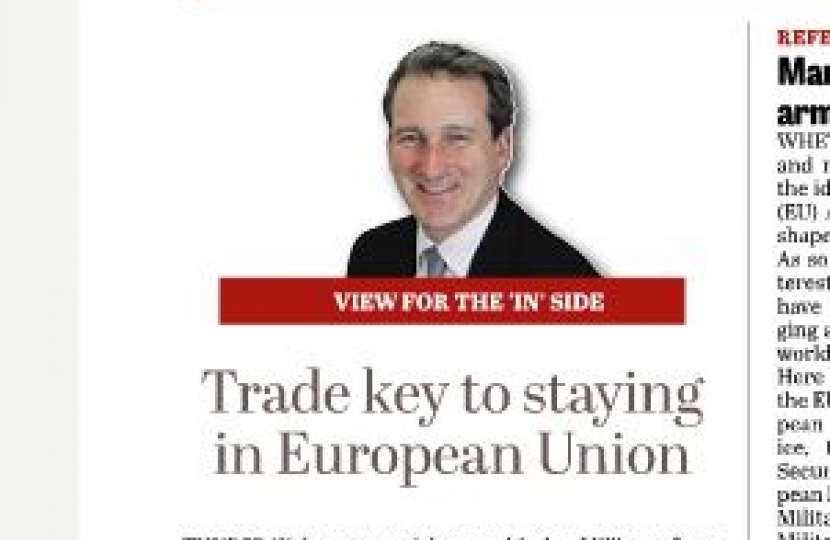
Damian puts the case for 'Remain' in his column published in the Petersfield Post today.
Thursday 23rd June 2016 is a very big day. Millions of people get their chance to vote on whether Britain remains part of - or leaves - the European Union.
At this late stage in the debate, soundbites and statistics have little sway. For those of you still undecided – which may be many – it will probably come down to a gut instinct of whether you believe leaving the EU is a risk worth taking, as it’s very much a leap into the unknown.
The strong economic growth we have seen over the last few years has been hard won, with a record number of people now in work, rising wages, and a highly competitive economy that is the biggest recipient of inward investment both in the EU and from the EU.
For me, a vote to remain is a vote to continue along that path, helping to keep people in work, protecting the funds we need for public services and creating the opportunities we want for the next generation.
The simple economic truth is that trade is good for economic growth, and we shouldn’t underestimate how important for us access to the single market has been, and is, to our trade. There won’t be some radically different alternative arrangement with the EU that Britain could negotiate that would be of comparable benefit.
And it’s just not realistic to think we could retain the benefits of the single market without accepting any of the costs or obligations of EU membership. No one else does. Why would other European countries agree to give Britain a better deal than they have themselves?
It is true that our growing economy attracts people to Britain from the EU – more jobs have been created in the UK since May 2010 than in all other nations of the EU put together. As continental economies strengthen their recoveries, the relative attraction will ease, of course. Moreover, the ‘emergency brake’ that the Prime Minister secured in his renegotiation means the unnatural draw of wage top ups through in-work benefits will be addressed.
The world is getting smaller, but the economic players in it are getting bigger. Alongside the emerging powerhouses of China and India, you have the ASEAN alliance in SE Asia, MERCOSUR in Latin America, and the African Union, as well as the European Union. As part of the EU bloc of 500 million people we have more negotiating weight in trade deals than we would alone. The question is not whether the UK could conduct its own trade talks and eventually reach agreements. Of course we could. But the real question is where we would come in our trading partners’ lists of priorities, and how strong our negotiating hand would be.
The EU is far from perfect, and more reform is needed. Britain has always been at the forefront of that progress agenda, from Mrs Thatcher’s vision for the Single Market, to our leadership today on driving world trade deals, environmental initiatives and completing the single market in Digital services. We also have a special status in the European Union – outside the Euro and the ‘Schengen’ border-free area, and with safeguards for our competitiveness and the interests of key UK sectors.
The technological, political, social and environmental possibilities of an increasingly inter-connected world are enormous. I want our great nation to maximise our contribution to, and our gains from, these extraordinary opportunities. I believe we’re best able to do that if we remain alongside our friends, allies and trading partners in the European Union.
Aticle written by Damian Hinds and published in the Petersfield Post on 22nd June 2016

